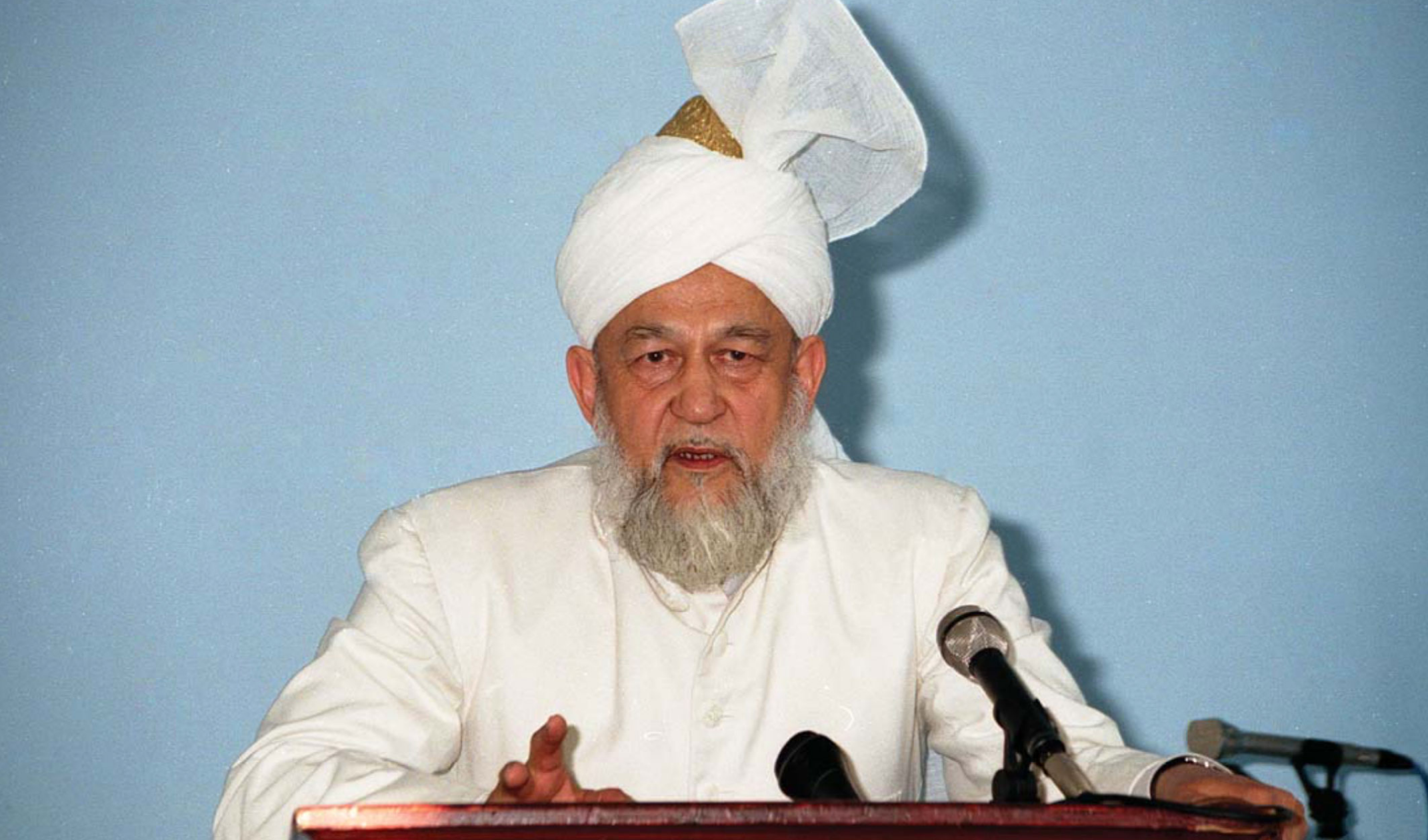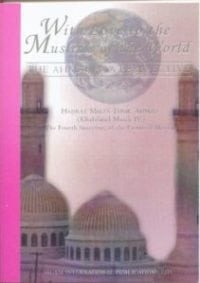Natural Disasters or Divine Punishment? (Part 4)

Printed in The Review of Religions, March 1994
This series of articles by the present Head of the Ahmadiyya Muslim Community were first published in the Al Furqan of Rabwah, Pakistan in 1976. The first two parts dealing with how natural laws are harnessed by God to afflict punishment have been published in the December 1993 and January 1994 issue of the Review of Religion. The present article continues to examine what distinguishes Divine punishment from natural disaster – a question partly discussed in the February 1994 issue.
IV. Distinguishing Features of Divine Punishment
The question that arises now is that if the opponents of Adam(as) were wiped off the face of the earth; if no sign exists of all those who rejected Noah(as); if those who pursued Moses(as) were engulfed by the waters of the Nile; if the enemies of David(as) were annihilated; and if those who believed in Jesus(as) triumphed over those who rejected him so much so that a few became many; the ruled became the rulers and the persecuted masters – then why was it that the punishment from on High which worked such miracles in support of the Prophets of the days gone by did no such thing in support of the Holy Prophet(sa) who was the Chief of the Prophets and the most perfect of the Messengers? Why indeed is it the material superiority gained by the latter over his opponents to date is far short of the gains made by those who believed in Jesus(as) in the first few centuries after the event of crucifixion over those who rejected Jesus(as)?
In response to the above question, the foremost matter to remember is that the Holy Quran has nowhere claimed that the object of Divine punishments is always, without exception, the extermination of an opponent nation. Although it refers to some such nations whose destruction had been decreed, this has not been decreed as a permanent maxim of God.
Indeed! If there be a maxim, it is only that as a result of a Divine punishment, the followers of Prophets prevail over the opponents. After this victory, a section of the opponents is preserved but in this preservation too we sometimes find some aspects of misfortune. We find many nomadic tribes in the world and many a people living out in the wilderness who eke out a threadbare existence of extreme misery and misfortune. If their past history is carefully pieced together, it is quite conceivable that as a result of the rejection of a Prophet sent unto them, their predecessors were accursed and were left behind survivors to serve as a lesson for mankind. However, this is not something that one can research on and prove beyond doubt but it is a hypothesis and a possibility.
As far as history is concerned, the Holy Quran presents the example of the Jews. The preservation of the Jewish race is an example of such a punishment. According to a prophecy of the Holy Quran, the saga of their ignominy and utter disgrace will continue to be preserved till the ends of time. In this connection, the Holy Quran affirms that Jesus(as) had been given the tidings of his followers prevailing over the disbelievers:
“And I will place those who follow thee above those who disbelieve until the Day of Resurrection.” [Al Quran 3.56]
This prophecy was gloriously fulfilled some three centuries after the death of Jesus(as) and bears testimony to the truth of the Holy Quran. It is most amazing that neither the Gospels nor the rest of the New Testament contain any reference to this prophecy even though this was so significant that the Holy Bible at least, should have been foremost to narrate it. Be that as it may, the Bible remained silent but the Holy Quran mentioned it. From that time to date, the history of the world bears witness in support of the Holy Quran. In passing, we may observe that another category of Divine punishment is that a nation can incur the wrath of God and be kept till the Day of Resurrection in a state of disgrace unable to rise again to its former glory.
An incidental question is that why is it that in this age the Jews have triumphed over a Muslim territory and how have they managed to establish a cruel rule in the heart of the Islamic world?
This is no place to discuss this issue in detail but suffice it to say that the Holy Quran contains a prophecy of this temporary victory. One purpose served by this prophecy is that it should become magnificently clear to the Jews and the people of the world that the displeasure of God Almighty is not an act of cruelty or oppression on the part of God. But because the character of the Jewish nation had become so evil and they had become so stonehearted that if they momentarily gained superiority, they would have descended to extreme cruelty and tyranny. Therefore, they did not deserve the reigns of the world be placed in their hands.
We return to the fundamental question that why was no Divine chastisement inflicted upon the opponents of the Holy Prophet of Islam (sa)? Such a sign would undoubtedly have granted superiority to the religion of the Prophet(sa) over his opponents. If the Holy Prophet(sa) was sent unto all mankind, a superiority gained over Arab nations alone could hardly satisfy rationality. Today, fourteen centuries after the advent of the Holy Prophet(sa), the conditions of Muslims is such that in comparison to the Christians alone, and we spare you any thought of other nations, the Muslims appear inferior in all aspects. It is the Christians who enjoy numerical strength; capital superiority; political power and military might. Likewise, in the intellectual, cultural and social spheres too, the Christians lead while the Muslims seem to be the led.
When we ponder over this issue, the first thing we have to find out is, what the term should be for the fulfillment of God’s promise to the Prophets of their victory. Unless we resolve the period required for an upper hand to be gained by a Prophet and his followers, we cannot reach any conclusion. When we study the history of past prophets from this angle, we observe that although victory can be clearly discerned as the culminating point, there appears to be no specific period which serves as a guiding principle applicable in each and every case.
Take for instance, the victory of Christianity. For three centuries after the ministry of Jesus(as), Christianity appeared to be a ship being tossed up and down, and down and up, with no end in sight. It passed through many phases when Christians were overrun by a mighty and cruel enemy and had to take refuge in subterranean caves and passages.
These underground passage which remind us of Asshabi Kahf, i.e., the Dwellers of the Caves, still exist in Europe and are more popularly known as catacombs which extend for miles on end. The labyrinth of these catacomb are so complex and dark that despite most modern means of lighting, droves of visitors have to follow a guide in Indian file to sightsee them.
Even then some visitors lose their way and are trapped by the labyrinth. Yet, the same dark passages were once bright and lit by the presence of the persecuted Christians who believed in the Unity of God. They were the people who found the dangers lurking above the soil to be far more grim and gruesome than the perils beneath it. Sometimes they lived in these passages for years and did not for a moment wish to renounce their faith in fear of the enemy without. Up above, just as Roman history twisted and turned, for better or for worse, the worse, the Christians would emerge for a breath of fresh air and a period of respite and then whenever cruelty ruled the day, they would submerge as if to hibernate. It continued like this till various forms of misfortunes piled on the miseries of the Roman Empire and culminated in its fall. The world then beheld the Christians emerging from the subterranean catacombs. They became the foundation and superstructure of the lofty towers of progress. Today, the sky scrapers erected by them can be seen talking to the skies. It is a strange manifestation of the Glory of God, therefore, that a people who could not live for the message of God on the surface of the earth and instead of living in the open, preferred, for the cause of God, to live in the niches, and dark recesses and crevices of the subterranean, God exalted them materially. Not only do their lofty towers seem to be talking to the skies but they themselves communicate through it. At times their ‘giant steps for mankind’ stamp the surface of the moon. Sometimes, their rockets fire spacecrafts which circle the planet. As far as the reality of the events is concerned, although from all human standards it seemed well nigh impossible and incomprehensible that three centuries after the death of Jesus(as), these powerless Christians would attain resounding success and be seen riding one day along the earth and above, yet the fact of the matter is that the impossible had been possible.
Jesus(as) was, of course, sent as a Messenger to the Israelites alone. Had other nations not used force in suppressing the message of Christianity, it is quite possible that Christianity might have confined itself to the tribes of Israel alone, though perhaps during its march forward, it may also have created a few byways on its left and right. But, whenever other nations have stood up juxtaposed to the unalterable law of God:
“Most surely, I will prevail, I and My Messengers,” [58.22]
they were struck by fear, suffered loss, were routed and resigned themselves to their defeat in every sense of the word.
In any case, there can be no grounds for doubt that in this fact, which can be proven on the authority of the New Testament, Christianity was a message of life for a particular nation only and a specific race. Its message was for a particular age also. As such, it was never meant to be a message for the whole universe. There is not even a passing hint that the teachings of Jesus(as) as contained in the New Testament were meant to be addressed to the whole world or applied in all ages.
Now, we note that in case of Jesus(as), who was:
“A Messenger to the children of Israel,” [3.50]
three centuries were needed to gain an upper hand. Not even then did the Christians fully prevail. Indeed, it may be correct to say that by then, the means of accomplishing victory had been procured.The claim of the Holy Prophet Muhammad(sa) was:
“O mankind! I am truly a Messenger to you all from Allah.” [7.159]
In other words, for all of you, whether you belong to the East or the West, whether you are white, brown or black or any other hue, to you, I have been sent as a Messenger of God. In pursuance of such a grand and lofty objective, and for such a great teaching for the whole world, it is only logical that a much longer period than the three hundred years for the followers of Jesus(as) should have been ordained.
When we look for guidance from the Holy Quran and Hadith (Traditions of the Holy Prophet), we see that the victory of Islam can be divided into two distinct eras. The first rise of Islam is obviously connected with nascent Islam and its time frame stretches from the times of the Holy Founder of Islam (sa), to the time decreed for its growth to slow down and come to a halt.
In this period of decline and material impotence, Islam would encounter extreme danger, when its days would seem to be an impending night.
After this protracted phase, God Almighty, would, out of His sheer Grace and limitless bounties, manifest His Glory once again. He would send a true reflection of the Holy Prophet’s saw resplendent glory once again `from among those who have not yet joined them'(see footnote 1) so that following in the footsteps of his Master, the Mahdi can rekindle the light of true faith in their hearts so much so that even if faith had ascended to the Pleiades (see footnote 2), the Mahdi and promised world reformer should restore its original shining brightness in their hearts.
When God Almighty revealed to the Holy Prophet Muhammad(sa) that Islam would prevail once again over all other faiths of the world, a companion enquired when that would be. The Holy Prophet(sa) responded: This will happen when the Messiah will descend (see footnote 3). He will break the Cross, kill the swine and come as the Judge and Arbitrator (to determine between nations, religions and sects).
In view of the foregoing, it is obvious that the apparent decline of Islam before its final and complete victory is not a sign which in any way adumbrates its ultimate defeat and failure but an interior phase which had to transpire, as decreed, as a precursor before its victory. Just as phases of rise and fall in fortunes were experienced by earlier people, this period of Islamic history had no influence on the permanent and unchangeable decree of God Almighty. So, no matter how awesome this perilous period of decline through which Islam had to transverse may have seemed, according to the prophecy of the Holy Prophet(sa), made fourteen centuries earlier, it represented no more than a temporary phase. Its removal had been pre-ordained and no power on earth could have altered God’s decree.
Therefore, the tiding had been given before hand that when the time for the advent of a Prophet, who would be the shadow and reflection of the Holy Prophet(sa) and who would come from among those who have not yet joined them, arrives, Muslims would once again be rejuvenated as Muslims. The confrontation and onslaught of Islam over Christianity would be spearheaded by a victorious general, who, having acquired the name of the Messiah, would shatter to pieces the edifice of the Cross and reduce Western civilization to nought.
When we reflect over these prophecies, our hearts are comforted by the thought that if the period of the decline of Islam was fulfilled to the letter, then undoubtedly the glad tidings of Islam prevailing over all religions of the world must surely be shortly fulfilled after cessation of the decline. How masterly has an English poet summed up this subject by saying:
“If winter comes, can spring be far behind.”
Thus, the Truth which gave omen of a winter, had in the same breath given the glad tidings of a spring, and if the winter came and passed away, the tidings of a spring must anyhow come to pass.
Footnotes:
- Al Quran 62.3/4
- Sahih Bukhari: Kitabul Tafseer Surah Al-Jumuah: III; p.727
- Sunan Abu Daud: Kitabul Mullahim, Bab Kharooj AlDajjal, p. 594 & Masnad Ahmad ibn Hanbal: 12.437


